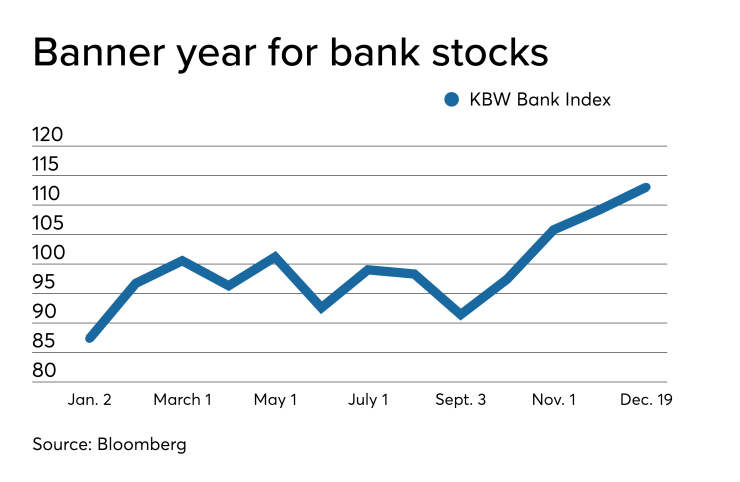Analysts are starting to think bank stocks may be all right next year.
Savita Subramanian at Bank of America is urging investors to buy the unloved sector. Citigroup’s Keith Horowitz has flipped his view with an admission his deeper pessimism in October was wrong. Bloomberg Intelligence’s Alison Williams is eyeing helpful cost controls and capital returns.
“U.S. banks outperformed in 2019 after a weak 2018 as a strong economic backdrop, a supportive regulatory environment, resilient U.S. consumer, and increased M&A activity more than offset trade tensions and global uncertainty,” RBC Capital Markets’ Gerard Cassidy wrote in a note. “We expect these beneficial trends to persist into 2020.”
Financial stocks should keep “grinding higher,” driven by growing earnings per share, “nice” yields of around 3%, buybacks, and “solid” expense and credit trends, Glenn Schorr of Evercore ISI wrote. He added that “market returns in 2020 could be pretty good as 17 of the past 20 election years (since 1940) have been up solid.” Schorr’s favorites include JPMorgan Chase, Bank of America and Morgan Stanley.
The fresh optimism is starting to outweigh some of the worries hanging over the sector heading into what may be a tough year in many respects.

Lenders may struggle as the Federal Reserve is likely to keep rates fairly steady, limiting banks’ margins. Commercial and consumer lending has been showing signs of softness, according to recent data, and bank executives who spoke at a Goldman Sachs financial services conference in December said growth could moderate in 2020. Investors will also need to wrestle with shifting regulatory expectations, as the presidential election heats up and candidates offer widely differing visions for financial companies.
Earlier this month, KBW said it would stay neutral on “universal” bank stocks in 2020. The firm forecasts 6.9% earnings year-over-year growth for the median universal bank stock, with much of that growth coming from share repurchases, as revenue will be challenged. “Capital return and underlying fundamentals are stable, but we expect the group to struggle to have positive operating leverage against a flattish yield curve and growth that remains fairly anemic,” analyst Brian Kleinhanzl said.
Geopolitics and asset prices may be key variables for revenue and earnings per share growth next year, Williams of Bloomberg Intelligence said. At the same time, U.S. interest rates and global growth risks are moderating, she said. That, along with “profit help from cost controls and capital returns” may help the banks.
BofA’s Subramanian, in an interview at Bloomberg’s New York headquarters, recommended buying a “basket of SIFIs,” the banks designated as systemically important financial institutions, like JPMorgan Chase & Co. and Citigroup Inc. That’s a bit of a contrarian view, as the financials sector is “unusually hated,” she said, noting that industry coverage has suffered a significant drop as the number of analysts focused on the sector has slipped.
She likes banks as regulation provides a “moat” around the industry, ensuring entry into banking is very costly and protecting the biggest lenders. Regulation has been a “crushing weight over the last 10 years,” she said. But the banks have healed since the financial crisis and are now likely poised to benefit from cost cutting and automation. “This sleepy sector is starting to get with the program,” Subramanian said.
“You don’t need rates to go up” for bank stocks to gain next year, she added, as they offer cheap yields. Loan books are relatively healthy, too, as most risky lending now takes place via other entities. All of this means the sector trades “incorrectly,” she said, as stocks get “whipped around based on macro.”
Relative winners Visa and Mastercard have been more “growth-y” than banks, Subramanian said. That makes them less attractive for 2020, as they’re “already crowded.”
Banks will probably continue to have difficulty boosting net interest margins, and may focus on fee income and expenses, as interest rates may not move much next year, John Carey, U.S. director of equity income at Amundi Pioneer, said in a phone interview.
Meanwhile, the presidential election is a “wild card,” Carey said. He has “no idea what regulatory changes might come,” he said, adding that “I scratch my head over some of the proposals” candidates have floated.
Carey also sees investment managers as continuing to face pricing pressure, partly as “the ETF craze doesn’t seem to have diminished.” Carey pointed to the
At Cowen, analyst Jaret Seiberg wrote that “regulatory changes and political pressure” are likely to prompt the biggest banks to favor dividends over buybacks in 2020, likely improving dividend yields. “Buybacks have become a political lightening rod in the wake of President Trump’s corporate tax cut,” he said, with Democrats arguing that companies are using tax savings to benefit insiders by purchasing stock instead of investing in capital expenditures and higher employee pay, he said. Democrats will “significantly expand their attacks on buybacks as we get closer to the election,” Seiberg said.
A mixed view on the sector was summed up by JPMorgan strategists led by Dubravko Lakos-Bujas. “While the outlook for financials remains positive, we do not see the sector leading the market higher,” they said. “Earnings growth is expected to be tepid though financials should remain a top sector for returning shareholder capital through buybacks and dividends.”
The KBW Bank Index has rallied 32% so far this year, compared with a 28% gain for the S&P 500. On Thursday, JPMorgan continued to retreat from Tuesday’s record close, with a drop of about 0.4%, while BofA fell about 0.1% and Citigroup climbed about 0.5%.





